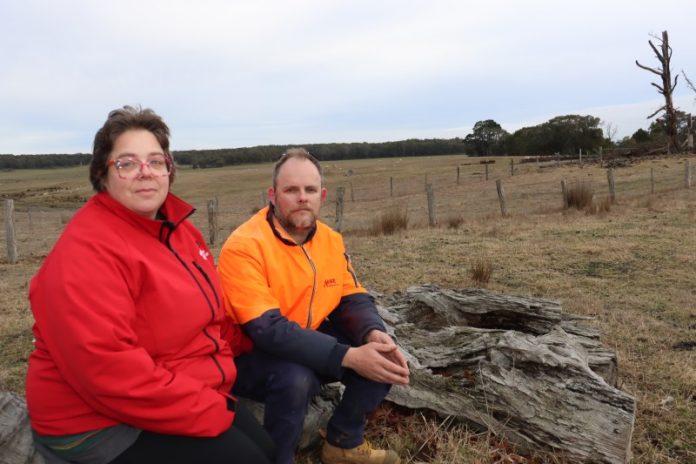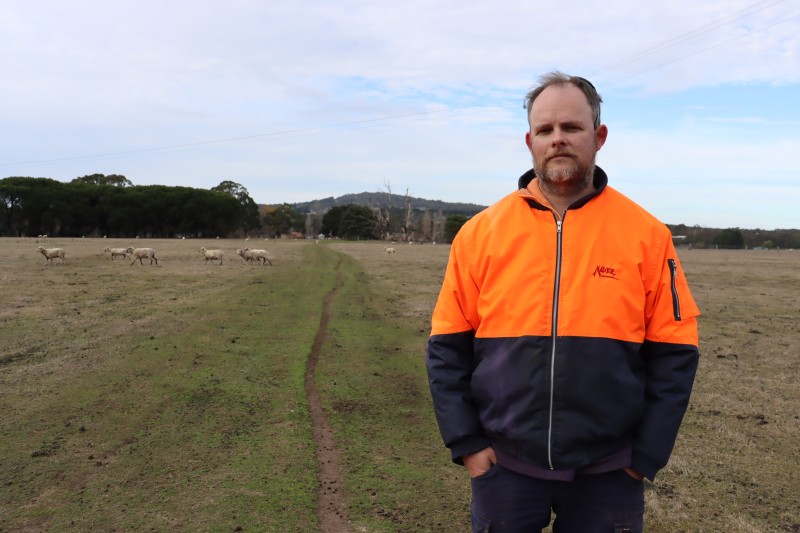
Fourth generation Gisborne sheep farmer Tom Neal could be the last in his family to work the land. He doesn’t like to think that but admits it’s a possibility he faces as more and more challenges emerge for Victorian farmers.
After months of drought and dry conditions across most of the state, the latest obstacle is man-made: the Victorian Government’s looming Emergency Services and Volunteers Fund.
The more expensive tax will replace the current Fire Services Levy from July 1. It will fund a wider range of emergency services that including fire services, the State Emergency Service, triple-0 and the state control centre, but farmers are going to be hit with the highest increases.
Protests have seen the government offer farmers a reprieve for the 2025-26 financial year but farmers fear the future charges could damage the industry.
Macedon Ranges Shire Council has calculated the ESVF levy will total about $12 million from all Macedon Ranges residents and businesses. This is reported to be an increase of $4.5 million on the current Fire Services Levy.
SUSTAINABILITY QUESTIONED
Mr Neal said the new levy added a whole new challenge to farm viability.
“Rather than taxing any type of income or profit margins through this levy, we are actually taxing assets of production themselves, regardless of whether money is made or lost,” he said.
“We really do need to think about whether that’s a sustainable, viable or economically reasonable thing to do, because if you are not making money on that asset, how can you pay it out?”
Mr Neal said having an unstable taxation base through the ESVF would mean an unreliable income stream for emergency services.
“I do accept that emergency services need to be funded but driving farmers off their land so they can’t even manage their own land properly is not an answer,” he said.
“I think we’re risking a full-on farm collapse, where farmers are just going to walk away or they’re going to go bankrupt. What we’re really doing is a lot of damage to our own primary production industries.
“I think this levy is a giant dis-incentive to anyone who wants to go into primary production. If I was thinking of starting it now, I wouldn’t do it.”
TIMES ALREADY TOUGH
Mr Neal farms sheep for meat and wool on a 1100-acre property. He has already seen challenges in recent years.
A drought about 10 years ago saw a change from black angus to sheep due to unreliable feed sources and related expenses.
About five years later, further dry conditions forced the farm to run at reduced stock levels, about 560 sheep, and the family is now selling firewood from fallen trees on the property to bolster their budget.
“There hasn’t been much grass growth for a number of years now,” Mr Neal said.
“There really isn’t very much growth even now (after some rain). These conditions severely limit the type of economic activity you can expect out of the land.”
The full extent of state government drought funding relief is not available to areas like Macedon Ranges, which has not been officially declared a drought area despite prolonged dry conditions.
Adding complexity is a Rural Conservation Zone on parts of Mr Neal’s property to protect valuable local flora and fauna. It’s something he has worked hard to carefully maintain but means some activities are restricted on the land, further limiting the economic productivity of the farm.
CONSIDER THE FULL COST
Despite being a fourth generation farmer, sale of his property has entered Mr Neal’s mind since the new tax was announced.
“If someone came along with a very good offer, it’s something that you’d have to consider, and I hate saying that, but I can’t destroy myself and my family because of government policy,” he said.
“I’ve spoken to a farmer from Ararat who fought for almost 18 months to receive just over $2500 in drought relief and then he’s got to pay out over $20,000 when his levy comes in. How ridiculous is that?
“There’s constant anxiety – that’s not a way for anyone to live. And without support from government, which we’re clearly not getting, why would anyone want to do that?”
The Neal family is calling on the state government to consider the cost of the new levy: financially, emotionally and sustainably.
“We’re now in a position where a lot of farmers are right up against the wall,” Mr Neal said.
“I think the state government needs to be more fiscally responsible and maybe consider slowing down some of the capital works spending. They are urban-centred and need to think of the entire state, not just one part of it.”
The Victorian Farmers Federation has called for the state government to scrap the levy and or consider reforms. Macedon Ranges Shire Council and Mount Alexander Shire Council have joined councils around the state to oppose the new levy.








